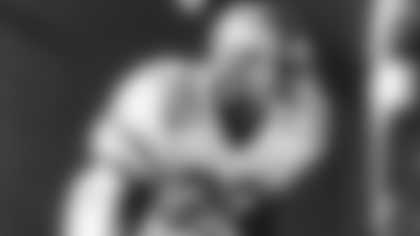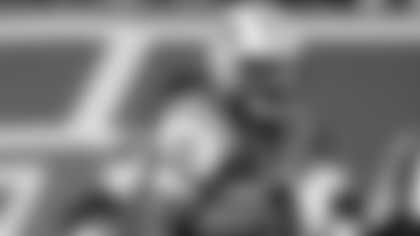
Having caught their attention while earning second-team All-America honors as a defensive end at McNeese State, the Jets were able to land Rusty Guilbeau after he took a detour following the 1982 NFL Draft.
"The Jets were very interested in me when St. Louis drafted me. They had spent a lot of time and I felt they had some interest at a later round instead of the third round," Guilbeau said. "Things just didn't work out at all for me in St. Louis. I broke a foot in training camp and it caused me to sit on the sideline for a long period of time. I just never really could show my talent.
"So, when they unfortunately released me, the Jets immediately started talking to my agent and picked me up. And it was at the time when Joe Klecko had an issue with his patella tendon. They created an opening, and in turn, I got to go to the Jets. The rest is history."
Guilbeau's history with the Jets began when Klecko's injury required surgery and sidelined him for the 1982 season. That was also when there was a 57-day players strike, which allowed Guilbeau to get to know his new teammates and…
"I think what it did more than anything, it gave me an opportunity to heal," Guilbeau said. "And when I got that opportunity to heal in that time when we were off and get back into shape, when the Jets came calling, I was at 100 percent instead at 80 percent trying to go through St. Louis' camp."
With his foot healed, the Jets activated Guilbeau late in the season, and had him play on special teams and as a backup defensive end. Experiencing the NFL for the first time – literally – was he nervous, anxious, both?
"Oh, definitely both. I never actually went to an NFL game until I played in one," said Guilbeau, who played in four regular-season and three playoff games as a rookie. "Coming from a school like McNeese State University, where you have, at best, 30,000 fans and go to anywhere from 70,000 to 100,000 fans was a big eye opener for me. So, yeah, nervous and anxious and all those words that go along with that were there.
"The biggest experience was going to Los Angeles (for the division playoff game at the Memorial Coliseum) and you had 105,000 people for that game. A lot of the guys, they played for Penn State or Michigan or people like that, and they'd experienced that. But I had never experienced anything like that."
Moved to outside linebacker after three seasons, Guilbeau helped the Jets reach the playoffs three times in his five years with the Green & White. His final season, 1987, was with the Cleveland Browns. What makes Guilbeau most proud of his NFL career?
"Being able to last six years. That's a young man's game and NFL stands for not for long," Guilbeau said. "I think I appreciate more at (age) 62 than I did at the time. So, my biggest accomplishment is just to get to that level. I understand more now how difficult it was to get to that level and stay on a team for that many years. I'm most proud of that.
"And I'm most proud of the all the people I met. And what I like about being in that fraternity is that I've got friends all over the United States. If I'm in their area and I need something, I could always call them and they'll be there for me. Or I can go visit them and see their lives and they can do the same when they come down to Louisiana. So, I'm proud of the people and I'm proud of the accomplishment of being on a team.
"I have a lot of fond memories. I left my heart in New York when I went to Cleveland. I loved everything about New York. The New York people, the Jets, the whole nine yards. People ask me, 'Who do you pull for?' Well, I always pull for the Jets because that's where me and my young bride made our first start in this crazy world."
Guilbeau and his bride, Tina, have a daughter, Holly, and a grandson, Collin.
Following his playing days, Guilbeau began working for United Vision Logistics in Lafayette, Louisiana. With the company for 32 years, and a part-owner for the last 10, he is its president and CEO.
"We are a non-asset-based business. Meaning I don't own the trucks, but we have 1,200, 1,300 trucks that we run all over the gulf coast," Guilbeau said. "We move oil field commodities to and from the coast and to and from land rigs, to where we move pipes and machinery and things of that nature on the flatbeds that we have.
"We have five truck types. Everything from a pick-up truck to move some samples for offshore all the way to something that can carry 200,000 pounds, a big generator or whatever they may need for the oil industry."
What does Guilbeau enjoy most about what he's doing?
"Well, like right now, the hurricanes that we had, both Sally and Laura, what I like about our job is that we always supply trucks, and even in the pandemic, we supply trucks and move freight to and from so people can have better lives," he said.
"People view the trucker as the last resort. They don't think much about it whenever their groceries are on their table or their furniture is in their house or the lumber is at their house to be built. But all that stuff is trucked by a truck driver. And it's a necessity. People don't realize that, but it's a huge necessity to have everyday life continue to go forward. All the things that are needed for you to go forward comes on a truck."














